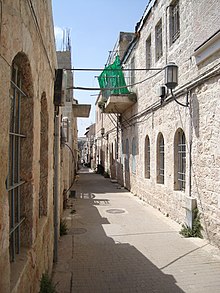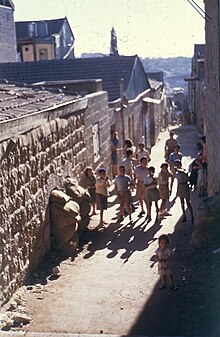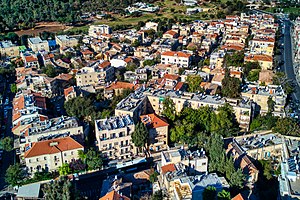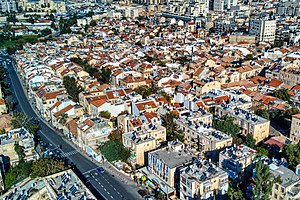Nachlaot

Nachlaot (Hebrew: נחלאות, also Naḥlaʾoth) is a cluster of 32 courtyard neighborhoods[1] in central Jerusalem surrounding the Mahane Yehuda Market. It is known for its narrow, winding lanes, old-style housing, hidden courtyards and many small synagogues.
Neighborhoods in Nachlaot (plural of nachala, lit. "homestead") include Batei Broide, Batei Goral, Batei Minsk, Batei Munkacs, Batei Rand, Bet Ya'acov, Even Yisrael (built in 1875 it is the oldest of the group), Knesset Yisrael, Mahane Yehuda, Mazkeret Moshe, Mishkenot Yisrael, Nahalat Ahim, Nahalat Zion, Neve Bezalel, Neve Shalom, Ohel Moshe, Shevet Ahim, Shevet Zedek, Sukkat Shalom, Zikhron Tuvya, Zikhron Ya'acov, and Zikhron Yosef.
Name
[edit]Nahala, plural nahlaot (with different ways of transliterating/spelling it), is a Hebrew word for either heritage or estate.
-
Nachlaot neighborhoods south of Bezalel Street
-
Nachlaot neighborhoods north of Bezalel Street
History
[edit]


The neighborhoods that make up the Nachlaot district were established beginning in the late 1870s outside the walls of the Old City, which was becoming increasingly overcrowded and unsanitary. The first was Even Yisrael, built in 1875 as the sixth neighborhood outside of the walls of Jerusalem's Old City. Its name was derived from the biblical verse (Genesis 49:24): "But his bow abode firm, and the arms of his hands were made supple, by the hands of the Mighty One of Jacob, from thence, from the Shepherd, the Stone of Israel." The numerical value of stone ("Even" in Hebrew) also corresponds to the 53 homes first built there.[2] Established that same year to the west of Even Yisrael, Mishkenot Yisrael is the second neighborhood of the Nachlaot.[3] The name comes from a biblical verse (Numbers 24:5): "How goodly are thy tents, O Jacob/Thy dwellings, O Israel." Mazkeret Moshe was founded by Sir Moses Montefiore in 1882 as an Ashkenazi neighborhood. Ohel Moshe is a Sephardi neighborhood established alongside it.
Former Israeli president Yitzhak Navon grew up in Ohel Moshe, and the neighborhood served as the inspiration for his play Bustan Sephardi (Sephardi Orchard). The Banai family, a famous family of actors and singers, lived in Nachlaot.[4] A Syrian Jewish community settled in Nachlaot in 1900 and built the Ades Synagogue, which was completed in 1901. Jerusalem's Mahane Yehuda outdoor market is located next to Nachlaot. Rabbi Aryeh Levin, known as the "prisoners' rabbi" for his visits to members of the Jewish underground imprisoned in the Russian Compound, lived in Mishkenot Yisrael. Nahalat Ahim, south of Rehov Bezalel, was founded in 1925 for the Yemenite community.[5]
In the wake of gentrification in the area, housing prices have risen steeply.[6]
Religious institutions
[edit]
At one time Nachlaot had a higher concentration of synagogues than anywhere else in the world, around 300 within a radius of just a few blocks.[citation needed] Many of these were not much more than a tiny room with space for only about a dozen worshippers.
The neighborhood includes the Ades Synagogue, Ades Congregation, the flagship of the Syrian Halebi community, as well as the synagogues located in the Knesset Aleph (Beis Rachel), Batei Broide, Batei Munkatz and Batei Rand neighborhoods, following the tradition of Old Jerusalem, including followers of the Vilna Gaon as well as Hasidic tradition.
Or Zaruaa Synagogue, founded in 1926 by Rabbi Amram Aburbeh for the Ma'araviim Jewish congregation, also served as a yeshiva for religious students. The building located on 3 Shmuel Refaeli street in Nahalat Ahim neighborhood was declared a historic preservation site in 1989, under cultural heritage protection. Rabbi Ben-Zion Meir Hai Uziel, the chief rabbi of Erez Israel, appointed Aburbeh as chief rabbi of the Nachlaot neighbourhood from 1924 to 1951. He was succeeded by Rabbi Rahamim Levy, who served as Rav of Nachlaot until 2013.
The Romaniote community of Jerusalem holds its religious services in the synagogue Beit Avraham Ve'ohel Sarah liKehilat Ioanina, which is also in Nachlaot.[7]
Yeshiva Sulam Yaakov was founded in 2006 by Rabbi Aaron Leibowitz; it serves, largely, the "Anglo" community.
Cultural landmarks
[edit]
The Gerard Behar Center, formerly known as Beit Ha'Am, opened in 1961.[8] It was the venue for the 1961 trial of Adolf Eichmann[9] and was renovated in 1983 as an arts centre.[10]
Barbur Gallery is a nonprofit space originally opened in Nachlaot for contemporary art and artists, offering changing exhibitions, musical performances, movie screenings, video-art and art lectures.[11] In 2020, the gallery relocated to the nearby Mamilla neighborhood.[12]
Notable residents
[edit]- Amram Aburbeh - Nachlaot's Chief Rabbi between 1925–1951
- Ehud Banai (born 1953) - singer and songwriter
- Yossi Banai (1932–2006) - singer, actor, and dramatist
- Uzi Baram (born 1937) - former member of the Knesset and government minister
- Alex Clare - English singer and songwriter, moved to Jerusalem in 2015
- Aryeh Levin (1885-1969) - Orthodox rabbi dubbed the "Father of Prisoners"
- Michael Levin (1984–2006) - American-Israeli paratrooper
- Rami Levy (born 1955) - founder and owner of Israeli's third-largest retail supermarket chain
- Uzi Narkiss (1925–1997) - Israeli general[13]
- Yitzhak Navon (1921–2015) - President of Israel; politician, diplomat, and author
- Yosef Qafih (1917–2000) - Yemenite-Israeli authority on Jewish religious law
- Aaron Razel (born 1974) - singer, musician[14]
- Yonatan Razel (born 1973) - American-Israeli singer, musician[15][16]
- Yosef Rivlin (1838–1897) - rabbi and neighborhood founder
See also
[edit]References
[edit]- ^ Ten things about Nahlaot in Globes (Hebrew).
- ^ Shaleṿ-Kalifa, Nirit.; שלו־כליפא, נירית. (2003). Naḥlaʼot be-lev ʻir : le-sayer ʻim Yad Ben-Tsevi bi-Yerushalayim. Miron, Eyal., מירון, אייל. Yerushalayim: Hotsaʼat Yad Yitsḥaḳ Ben-Tsevi. p. 28. ISBN 965-217-213-8. OCLC 53348945.
- ^ Shaleṿ-Kalifa, Nirit.; שלו־כליפא, נירית. (2003). Naḥlaʼot be-lev ʻir : le-sayer ʻim Yad Ben-Tsevi bi-Yerushalayim. Miron, Eyal., מירון, אייל. Yerushalayim: Hotsaʼat Yad Yitsḥaḳ Ben-Tsevi. p. 6. ISBN 965-217-213-8. OCLC 53348945.
- ^ "Jerusalem Architecture in the late Ottoman Period - Jewish Virtual Library". Jewish Virtual Library.
- ^ Jerusalem Post article[permanent dead link]
- ^ "Nachlaot". GoJerusalem.
- ^ Ioanina's Jews: Remnants of a vibrant Romanioti community, 09/11/15. Retrieved on 22.07.2018
- ^ "The Gerard-Behar Center in Jerusalem". Jerusalem.com. 3 May 2013. Retrieved 1 April 2016.
- ^ Shandler, Jeffrey (1999). While America Watches: Televising the Holocaust. Oxford University Press. p. 90. ISBN 0195182588.
- ^ Selig, Abe (11 June 2009). "How Behar Changed Its Stars". The Jerusalem Post. Archived from the original on 5 May 2016. Retrieved 1 April 2016.
- ^ "Top 5: Contemporary art hotspots". The Jerusalem Post - JPost.com.
- ^ "Jerusalem gallery wins Supreme Court ruling against municipality eviction". The Jerusalem Post | JPost.com. Retrieved 2021-01-26.
- ^ Cashman, Greer Fay (1997). "A defender of Jerusalem (partial interview)". Archived from the original on 2005-04-10. Retrieved 2010-12-13.
- ^ "A Special Sukka – Only in Nachlaot". Yeshiva World News. 4 October 2012. Retrieved 24 February 2015.
- ^ Steinberg, Jessica (March 19, 2013). "A classical twist on spiritual, religious song". The Times of Israel. Retrieved February 24, 2015.
- ^ Granot-Granevich, Aharon (1 August 2012). "Miracle Song". Mishpacha. Retrieved 24 February 2015.



